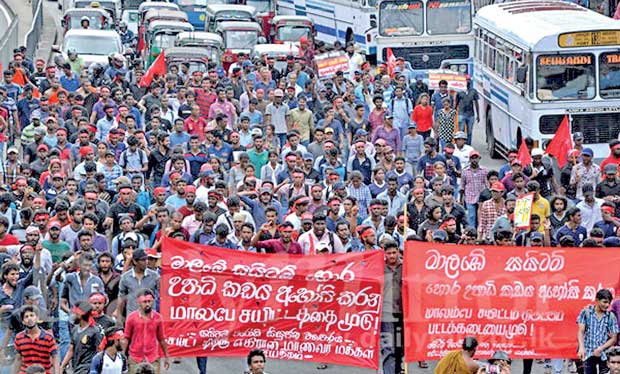27 Oct 2017 - {{hitsCtrl.values.hits}}

 Nowadays, wherever we look at, we see strikes and agitations that disrupt people’s day-to-day activities causing a considerable economic cost, which is in my opinion, not widely discussed. It is accepted all over the world that every citizen in a democratic setting is entitled to the right to express his or her objection very legitimately and peacefully, in order that the best can be implemented for the betterment of all. Even if those badly impacted by strikes become violent on certain occasions, pointing out how they impact on daily activities, a wide discussion about the economic cost has not yet emerged among the public, especially policymakers.
Nowadays, wherever we look at, we see strikes and agitations that disrupt people’s day-to-day activities causing a considerable economic cost, which is in my opinion, not widely discussed. It is accepted all over the world that every citizen in a democratic setting is entitled to the right to express his or her objection very legitimately and peacefully, in order that the best can be implemented for the betterment of all. Even if those badly impacted by strikes become violent on certain occasions, pointing out how they impact on daily activities, a wide discussion about the economic cost has not yet emerged among the public, especially policymakers.
Labour, one of the main production factors in an economy used to generate income, should be supplied uninterruptedly, so that the smooth production process can continue, producing quality goods and services for the market.
Whenever the quality of the labour goes down, hampering the quality of the product, it reduces sales and then revenue for companies that on the other hand, create employments and pay taxes.
Businesses cannot be expected to expand their operations, which ultimately raise employments; one of the main problems faced by the nation at present is paying more taxes, which mainly decides the level of the government’s revenue, to be allocated for the well-being and administration in the country.
Necessity
It cannot be refuted that people have won their rights through these kinds of strikes and agitations, where they were hard to achieve by negations. A labour force severely restricted by rules and regulations cannot actively contribute to economic development. Hence, unions and their right to go against things that dismantle their industries have to be assured.
Even if the necessity is to agitate or go on strikes on genuine purposes, like improving their working environment, increasing salary and raising their voice against anything that doesn’t secure employments, almost every agitation here in Sri Lanka seems to have been politically motivated.
As long as economics is away from politics, a country can easily be developed. It is when economics is blended with politics that the economy is mismanaged. One could observe how a sudden wave of strikes and agitations under whatever reason emerged in the country for the past two years, which have dragged the nation back.
Leave politics aside and focus on the economy, you can quickly grasp that how much labour the country has wasted by being engaged in mostly politically-motivated activities. In my perspective, aiming at weakening a political party or parties weakens the economy spontaneously, as it directly impacts on the economy, but not politics.
Foreign view
Sri Lanka is a country always thirsty for foreign direct investment (FDI), as it brings not only capital but also sophisticated technology needed for developing the nation. Just because we kindly invite them to come and invest in the country doesn’t mean they would invest solely based on our invitations. Investors make a thorough analysis on many factors such as business environment, quality of the labour force, tax, etc.
When the quality of labour goes down, the investors are discouraged to invest in labour-intensive industries. Despite cheap labour in other countries like Bangladesh, why should the foreign investors invest in Sri Lanka? Even though the workers in the public sector go on strikes; it has a spillover effect on the private sector as well. In a nutshell, the economic image of the country is tarnished by these agitations.
Recently, exporters also decried over the strikes and agitations, which hamper their operations. When the exporters, who are directly connected with the world market, get affected like this, it is needless to say how the foreign investors view Sri Lanka as an investment destination. Hence, before plans are made to attract FDI, labour efficiency and productivity, which are currently at stake, must be at good condition.
Solutions
Whatever the solution suggested for this issue has to be moderate enough, so that democracy and economic development both can be ensured at once. From July to date, the country having experienced an aftermath of strikes, has not been able to come up with a long-term solution. Each and every government uses its own method to counter strikes and agitations but they are very temporary remedies, which only exist during those regimes.
Although early warning is something ethical prior to a strike, the passengers were able to know it once they arrived at the railway stations at the time of the recent railway strike. These kinds of actions should not be repeated. While the right to carry out strikes and agitations is fully assured, victimization has to be mitigated to a certain extent.
Nalaka Jayasena, a lecturer at the University of Colombo, recently suggested that the government should properly use the media and especially social media to weaken the strikers and agitators by building a wall of objection among the public. The strikes become stronger, when they get public support.
In conclusion, the economic cost caused by strikes and agitations not only has a considerable impact on the economy but also gets the economic image tarnished by foreign investors. Consequently, the situation should be somewhat mitigated in order to achieve economic development.
(Amila Muthukutti is an economist)
04 Jan 2025 4 hours ago
04 Jan 2025 4 hours ago
04 Jan 2025 5 hours ago
04 Jan 2025 5 hours ago
04 Jan 2025 6 hours ago